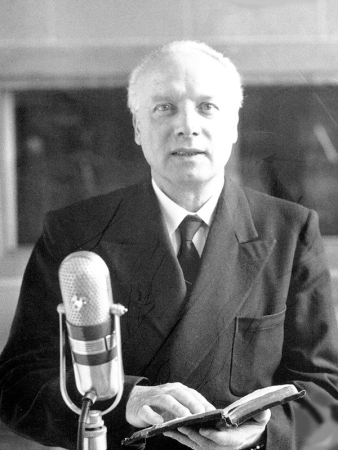
Who would have managed to do the same?
It was 21st June 1895 and in Smíchov, Prague, Přemysl Pitter, later a well-known Czech priest, writer, publicist, pacifist, and social worker was born into the family of a printing shop owner. The Izraeli Yad Vashem pronounced him The Righteous Among the Nations for his life-long conduct in 1964.
He grew up in Smíchov, went to a printing school in Leipzig and after his father’s death in September 1912 he took over his business. In 1914 the eighteen-year-old Pitter volunteered for the Austro-Hungarian Army but was profoundly shattered by the war atrocities at the fronts. He deserted twice, was sentenced to death twice and luckily escaped capital punishment twice. He returned home a convinced and active pacifist. He then devoted his interest and care predominantly to the youth. In 1933, he founded “Milíč’s House” in Žižkov, where he opened a care home for Czech abandoned and needy children. Pitter was assisted in his efforts by F. Krch, A. Pohorská, Mr. and Mrs. Rott, J. Šimsa and others and a Swiss Olga Fierzová who later became Pitter’s faithful colleague and life partner. Throughout this time, children of German antifascist exiles also found refuge in Milíč’s House. After the German occupation of the country, Pitter also looked after Jewish children, whose parents had been deported to concentration camps by the Nazis. Because of these activities, the Gestapo threatened to arrest him. However, he was fortunate enough to escape this fate. In 1944 he and Krch founded the illegal Committee of Christian Help for Jewish Children, who had lost their parents during the war. Přemysl Pitter experienced his first big shock in the initial days of May 1945, in Prague, when he witnessed sadistic violence committed on German people by the mob. He writes in his notebook: “Our nation has never been as illiberal as it is today, so enslaved by revengefulness, controlled by sinister instincts and inconsideration. How can the nation of Hus and Masaryk burn its enemies alive and torment their women and children?”
Pitter encountered another cruel experience in Terezín, as the Czechoslovak authorities had transformed this former Gestapo prison in Small Fortress into a detention camp for Germans and concentrated a number of German children there. As soon as Pitter learned about this camp, he immediately set off to Terezín. He was horrified to find out into what conditions0these post-war prisoners including children had been thrown. Pitter decided to help at least those children who had a chance of surviving. On 22nd May he transported twenty-two children from the fortress in Terezín into the mansion house in Olešovice where he established the first dormitory. He then kept transporting further tens and hundreds of them into mansion houses in Kamenice, Štiřín, Lojkovice and Ládví, however, this time not only German children but also Jewish orphans whose parents had died in Nazi concentration camps. In their cohabitation, Přemysl Pitter helped his children overcome the differences of their fates, innate prejudice as well as mutual hatred by the means of humanistic ideals and love.
After the communist coup, in February 1948, Milíč’s House was nationalized and Pitter faced the threat of forced labour in uranium mines. He and Olga managed to flee to West Germany where both of them continued their activities until 1962. Afterwards, they moved to Affoltern am Albis in Switzerland, founded several supportive compatriot societies and funds and from 1962 published a magazine called Talks with Writers. Pitter’s efforts were particularly recognized in Jerusalem where his name was eternalized on Mount of Remembrance. In 1973 Pitter was awarded the Grand Cross of Merit First Class by the Federal Republic of Germany, on the occasion of his 80th birthday he was awarded a Theology Doctorate of Honour by the University of Zurich and in 1991 he was awarded in memoriam the Order of T. G. Masaryk by Václav Havel. Přemysl Pitter died in Zurich on 15th February 1976. As he had wished for no funeral ceremony his ashes were simply scattered around in the local cemetery.
Written in June 2012
For the Terezin Memorial Luděk Sládek
www.facebook.com/TerezinMemorial
www.pamatnik-terezin.cz
Nesouhlas se zpracováním Vašich osobních údajů byl zaznamenán.
Váš záznam bude z databáze Vydavatelstvím KAM po Česku s.r.o. vymazán neprodleně, nejpozději však v zákonné lhůtě.